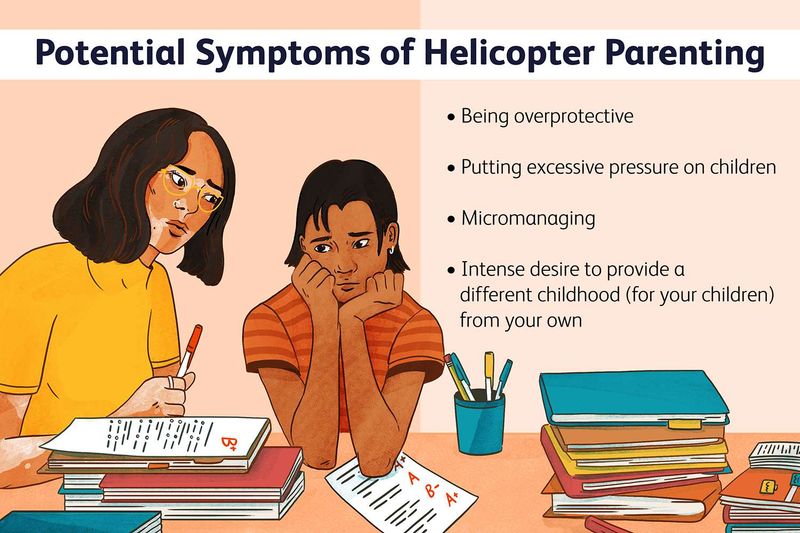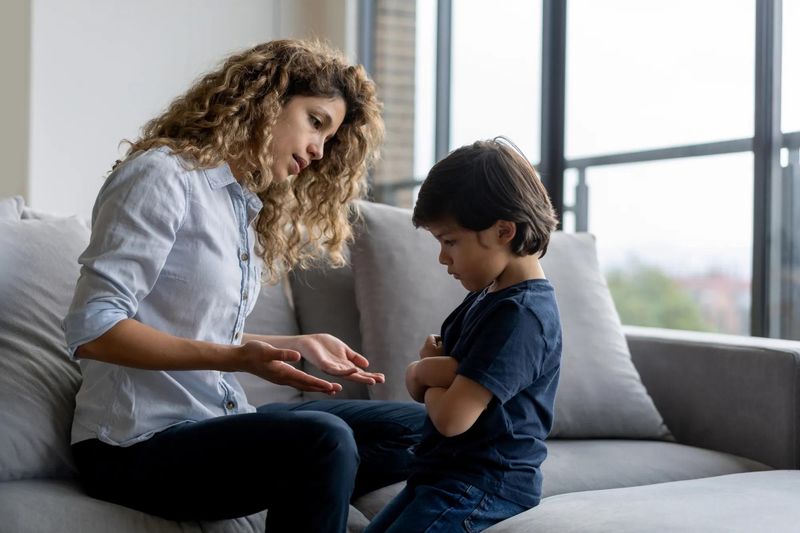Raising children is a journey filled with moments of joy, challenges, and growth. As parents navigate this path, they often make decisions with the best intentions, only to realize their missteps years later.
This reflection explores 19 common mistakes parents recognize once their children are grown, offering insights and learnings that foster understanding and empathy.
1. Prioritizing control over connection
Parents often believe that maintaining strict control is essential for raising disciplined children. However, it sometimes overshadows the importance of building a genuine connection. This control can create barriers, leading teenagers to rebel or hide their true selves.
Reflecting back, parents might realize the value of nurturing a strong relationship built on trust and understanding rather than authority.
Open communication and mutual respect often yield more balanced and emotionally healthy adults. Prioritizing connection over control fosters an environment where children feel valued and heard, shaping a stronger familial bond in the long run.
2. Saying “because I said so” too often
“Because I said so” becomes a default response in the whirlwind of parenting. It’s a phrase that halts inquisitive minds and stifles curiosity. While it might be a quick fix, it teaches children to accept things without understanding reasons.
In hindsight, explanations encourage critical thinking and respect, allowing children to learn about consequences.
By engaging in meaningful dialogues, parents can foster a more inquisitive mindset. Encouraging questions opens pathways to mutual respect and learning, making children feel included and valued.
3. Not apologizing when wrong
Admitting mistakes is hard, especially for parents who feel the need to portray perfection. But owning up to errors teaches humility and responsibility. Children respect parents more when they witness their honesty and vulnerability.
Reflecting on past arguments, parents may wish they had modeled accountability by apologizing when wrong.
This simple act can mend relationships and nurture a culture of openness and forgiveness. It sets a precedent for future interactions, teaching kids that everyone makes mistakes and the importance of making amends.
4. Ignoring their emotional needs
Emotional needs are often sidelined in favor of academic or physical accomplishments. Parents may focus on report cards and sports trophies, overlooking how their children feel.
Years later, they might realize that emotions are the foundation of a child’s well-being. Addressing emotional needs early can prevent future struggles with self-esteem and relationships.
Promoting emotional intelligence is crucial, as it equips children with resilience and empathy. Understanding and supporting a child’s emotional world forms a balanced, compassionate individual.
5. Dismissing big feelings as “drama”
Teenagers are often dismissed as dramatic, but their feelings are real and significant. These expressions are their way of navigating complex emotions.
Parents might look back and understand that dismissing such feelings was a missed opportunity to connect and guide.
By validating their child’s emotions, parents can help them develop emotional maturity and confidence. Listening and acknowledging these feelings teaches empathy and respect, strengthening the parent-child relationship.
6. Comparing siblings
Siblings inevitably face comparisons, often leaving one feeling inadequate. Parents might compare achievements, unintentionally fostering rivalry and resentment.
Reflecting back, the realization dawns that each child is unique, deserving of individual recognition and praise.
Celebrating differences and strengths encourages self-esteem and personal growth. Acknowledging each child’s identity fosters a supportive and harmonious family environment, where every member is valued for who they are.
7. Over-scheduling childhood
In an effort to provide opportunities, parents often over-schedule their children’s lives. Music lessons, sports, and academic clubs can overwhelm young minds, leaving little room for play and creativity.
Looking back, parents may wish they had allowed more unstructured time for children to explore and imagine.
Balancing structured activities with free time encourages creativity and personal growth. It allows children to discover their interests and passions organically, free from the pressure of constant performance.
8. Trying to be the “cool” parent
Striving to be the “cool” parent often blurs boundaries. In trying to relate to their kids, parents might compromise authority and discipline, leading to confusion and disrespect.
Reflecting on this, parents often realize that children benefit more from guidance and clear boundaries than from friendship.
Balancing approachability with authority strengthens relationships and provides kids with the structure they need to thrive. It ensures they feel safe and understood, yet guided and supported.
9. Projecting your dreams onto them
Parents naturally wish to see their children succeed, sometimes projecting their unfulfilled dreams onto them. This pressure can stifle the child’s own aspirations, creating tension and dissatisfaction.
In hindsight, parents realize the importance of nurturing their child’s individual passions and goals.
Supporting their unique journey fosters self-discovery and happiness. Encouraging autonomy ensures children grow into fulfilled, independent adults who pursue their own dreams with confidence.
10. Assuming they weren’t listening
Parents often underestimate how much their children absorb from their surroundings. Assumed inattentiveness can lead to missed opportunities for meaningful communication and teaching.
Years later, parents may recognize that their children were absorbing values, attitudes, and behaviors all along.
Being mindful of words and actions reinforces positive learning and development. It’s crucial to model the behavior and values we hope to instill in our children, knowing they are always watching and listening.
11. Not making space for failure
Failure is a powerful teacher, yet parents often shield their children from it. By rushing to rescue, they might inadvertently deny them essential life lessons.
Reflecting on this, parents see the value in allowing children to face challenges and learn resilience.
Creating a safe space for failure encourages problem-solving and independence. It builds confidence and perseverance, teaching children that mistakes are stepping stones to success.
12. Focusing too much on grades
Academic success is important, but an overemphasis on grades can overshadow other vital aspects of development. This focus may lead to undue stress and anxiety, affecting a child’s mental health.
In hindsight, parents often realize that nurturing creativity and emotional intelligence is equally important.
Encouraging a well-rounded development fosters a happier, more balanced individual. It’s essential to praise effort and growth, not just achievement, to cultivate a love for learning and personal growth.
13. Talking but not really listening
Communication is a two-way street, yet parents sometimes dominate conversations, missing the chance to truly listen. This oversight can lead to disconnect and misunderstandings.
Parents reflecting on this realize the importance of active listening. By giving their children space to express themselves, they build trust and understanding.
Listening empathetically fosters a supportive environment where children feel safe to share their thoughts and feelings. It strengthens the bond, ensuring children know they are valued and heard.
14. Being emotionally unavailable
In the hustle of daily life, emotional availability can sometimes take a backseat. Parents preoccupied with work or personal issues might miss cues from their children, leaving emotional needs unmet.
Reflecting on this, parents see the importance of being present and engaged. Emotional availability ensures children feel loved and supported, fostering secure attachments.
Prioritizing emotional connection nurtures a resilient and emotionally intelligent individual, ready to face the world with confidence and empathy.
15. Relying on fear instead of respect
Fear can be an easy tool for compliance but it often breeds resentment and insecurity. Parents might use fear to control, missing the opportunity to teach respect and understanding.
Over time, they may realize that respect is earned through empathy and communication, not intimidation.
By fostering a respectful relationship, parents encourage mutual understanding and trust. This approach builds a more positive environment where children feel valued and empowered to express themselves.
16. Missing who they were becoming
Caught up in the day-to-day, parents might miss the subtle transformations in their children’s lives. In hindsight, they wish they had been more attentive to who their children were becoming.
Acknowledging and celebrating growth fosters a supportive environment. It ensures children feel recognized and appreciated for their unique journey.
Being present in their development nurtures a stronger bond and a deeper understanding of their evolving identity and aspirations.
17. Letting tradition override individuality
Tradition provides cultural grounding but can sometimes stifle individuality. Parents might insist on customs, missing their child’s personal expression.
In reflection, they see the importance of balancing tradition with individuality, allowing children to develop their own identity.
Encouraging self-expression alongside tradition fosters a strong sense of self and cultural appreciation. It ensures children feel free to explore their identity while remaining connected to their roots.
18. Assuming they’d always need you
Parents often assume their role will always be needed in the same way. They might struggle to adapt as their children grow into independent adults.
Reflecting on this, parents understand the importance of supporting independence, allowing children to fly.
Adapting to changing roles strengthens familial bonds, nurturing a relationship built on mutual respect and love. It ensures that as children grow, the relationship evolves positively, embracing change and growth with grace.
19. Forgetting they grow up faster than you think
The years fly by, often catching parents off guard. They might get lost in the routine, forgetting how rapidly their children grow.
In hindsight, parents cherish the fleeting moments, wishing they had savored the journey more.
Being present and engaged in each stage of development creates lasting memories and connections. It ensures that both parents and children appreciate the beauty of growth and the preciousness of time together.




















